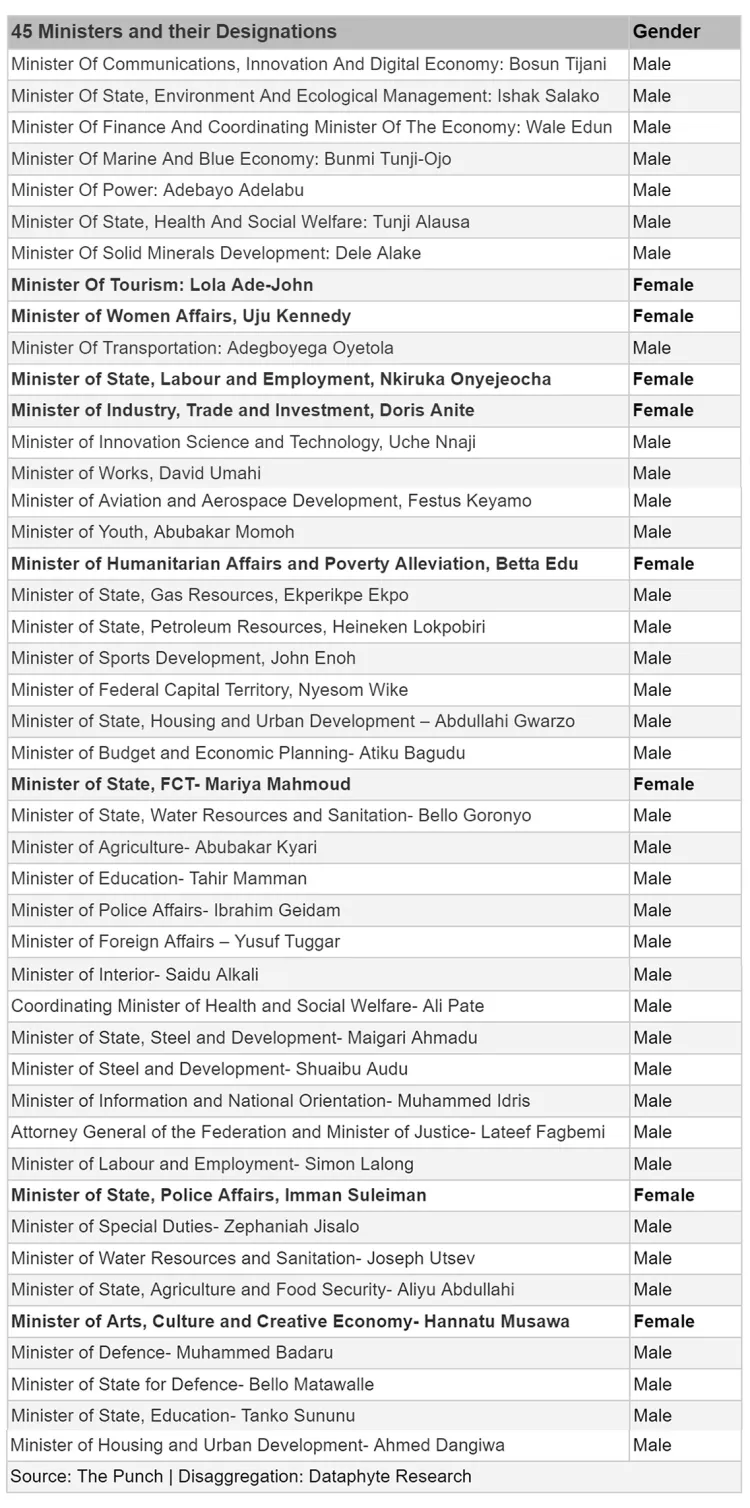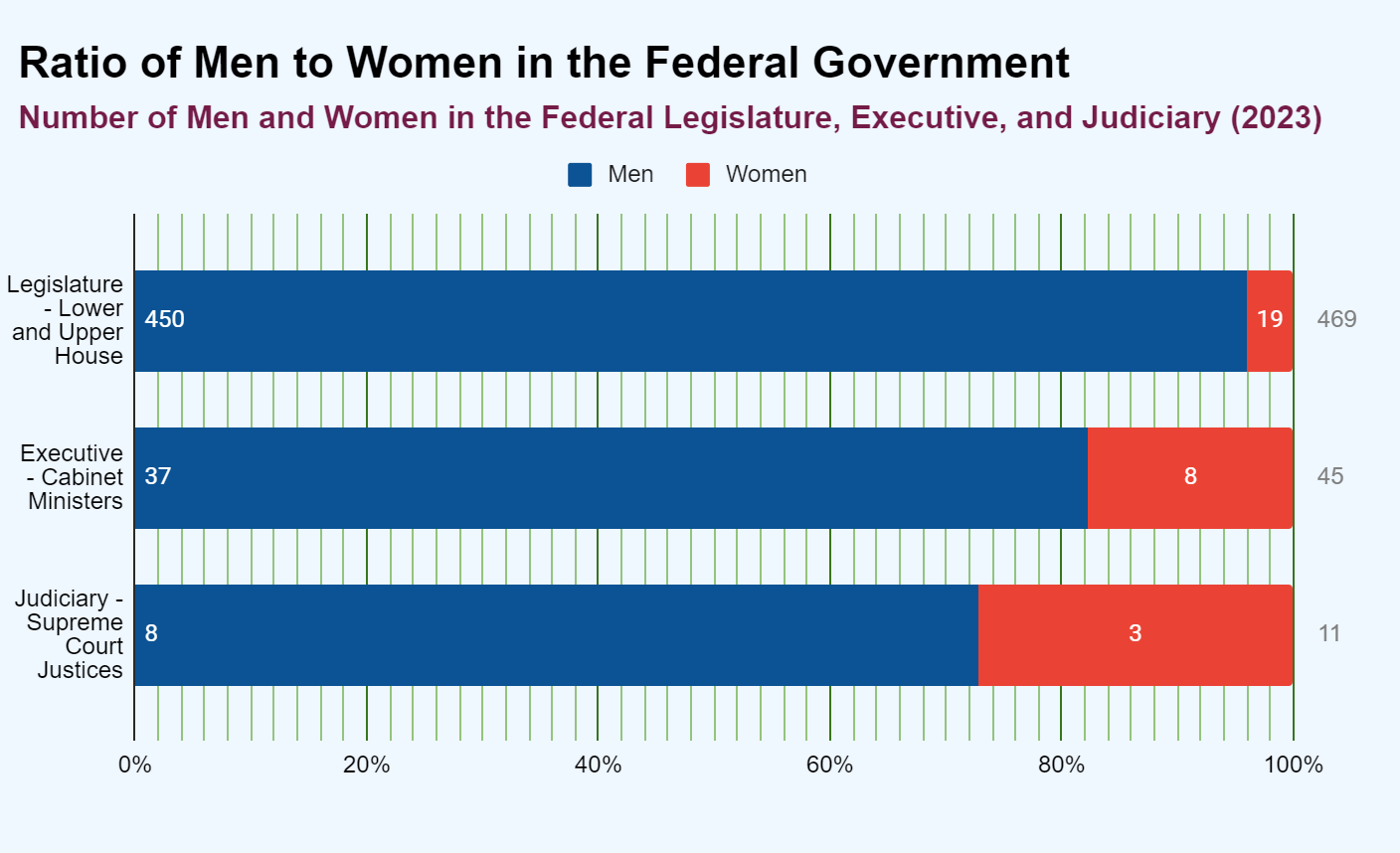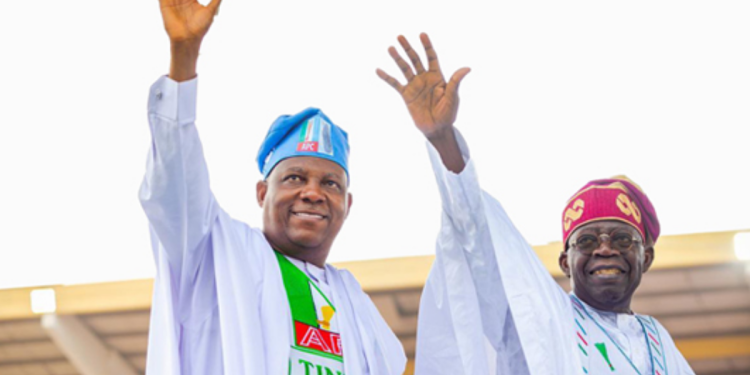Last October, Mr Bola Ahmed Tinubu was everything but the President of Nigeria, Africa’s most populous country.
At the time, Dataphyte moderated the controversy surrounding Tinubu’s choice of a presidential running mate. He had chosen Kashim Shettima, an individual of like faith, as his vice presidential running mate.
Choosing a presidential running mate from the same faith was unpopular in Nigeria. The country has a tradition of seeking inclusion of people from all cultures and faiths in political appointments.
We stressed then that the governance issue at stake was not the Tinubu-Shettima ‘Muslim-Muslim’ ticket but the preponderance of male-male tickets in all the major political parties.
The lack of gender inclusion in candidates’ choice of running mates at the federal and gubernatorial races for the executive offices was apparent.
All the major political parties at the time had male-male President-Vice President candidates.
Beyond that controversial joint ticket with Kashim Shettima, President Tinubu has chosen even more ministers and advisers to co-lead Nigeria with him, attracting cheers and criticism from different quarters.
Dataphyte checked Tinubu’s subsequent choice of the first set of 45 ministers. It seems the former APC candidate has not changed in his exclusion of females from his joint leadership picks.
Only 8, or 18% of President Tinubu’s 45 cabinet ministers, are females. The other 37 are males.
The 8 female ministers are Lola Ade John, Doris Anite, Nkiruka Onyejeocha, Uju Kennedy, Betta Edu, Mariya Mahmoud, Imman Suleiman, and Hannatu Musawa.

Yet, compared with the federal executive arm of government, the proportion of women is even lower in the federal legislature.
Only 19, or 4% of the 469 federal legislators, are females. The other 450 members are males.

Business Day reported that “the dwindling number of women elected into the nation’s parliament has continued in the 10th Assembly. Experts say the situation is deplorable, especially considering increased agitations for having a gender-balanced parliament.
“In the Senate, out of the 109 senators, three are female, which was a reduction from the seven in the 9th Assembly.
“All female senators in the 9th Assembly lost their re-election bid, going away with rich legislative experience.”
“In the House of Representatives, sixteen women were sworn in out of the 360 lawmakers, there is a slight increase here, compared to 13 in the previous House.”
Last October, Dataphyte reported that the “economic and political opportunities for women are on the decline” when the Global Gender Gap Index in 2022 is compared with that in 2017.
“A token of 22 female legislators to 100 male legislators by 2027, or simply 2 female legislators to 10 male legislators in the Local government councils, State legislatures, and the National Assembly by 2027,” was proposed in the report.
Except for the Supreme Court, no other arm of the federal government made this minimalist progress to the 22% female inclusion in the highest political positions in the country.
The consequences of excluding women from political and business leadership or prioritising religious inclusion over gender inclusion are found in this throwback of “Agenda 2023: Male-Male Ticket, Muslim-Christian Thicket, and a Modest Male Trinket”
Agenda 2023: Male-Male Ticket, Muslim-Christian Thicket, and a Modest Male Trinket
The lead-up to Nigeria’s 2023 general elections could have been less dramatic if the All Progressive Congress (APC) presidential candidate, Senator Bola Ahmed Tinubu, simply insisted that he could not remember the religion of his running mate, Senator Kashim Shettima, just as he insisted he could not recollect the primary and secondary schools he attended when he filled his 2003 INEC governorship form and 2023 INEC presidential form.
Unfortunately, many people all over the country are persecuting Mr Tinubu for opting for a “Muslim-Muslim ticket” just because he fessed up once that he remembered his classmates — no, his running mates and their religion, and stands by his recollections. Yet, there is something about Mr Tinubu’s choice of a VP that shifts the people’s attention from an unarguable injustice among all the major political parties — the exclusion of females as presidents or vice presidents in 2023.
According to the World Economic Forum’s Global Gender Gap Index, “The subindex where Nigeria has the widest gap to close is Political Empowerment, which has been widening since 2012 and currently stands at 96%.”
This means Nigeria maintains a 96% disparity or 4% equality between women and men in political positions at the beginning of 2022. This means the female: male ratio is 4:100 or 1:25.
.png)
Up till now, no one has asked why Tinubu did not choose a Muslim female from the North as his Vice President, why Abubakar Atiku did not choose a female Christian from the south, or why Peter Obi did not choose a female Muslim from the North for the same role, or why a female Muslim-Christian presidential candidate did not emerge in any of the 3 prominent parties, APC, PDP and LP.
Besides the elected Executive positions, Nigeria had 29 female House of Assembly members to 440 Males – less than 7 women representing the female population which is about half of the population while 100 men represent the other half population which is male.
.png)
In discussions on inclusion as a developmental goal towards 2023 (together with other forms of inclusion), is anyone talking about the inclusion of females, who are approximately half (49.3%) of the 206.14 million population as of 2020, for elective and appointive positions, especially when Muslim-Christian males have shown incremental cluelessness in the past decade and an incorrigible calling to ground the country in deaths and debts, and when science is providing new evidence that females are more suited to solve a problem like Nigeria?
Male-Male Ticket: The Price of Male Dominance
The audacity of a male-male ticket, in Tinubu-Shettima, Atiku-Okowa, Obi-Datti, and many other 2023 presidential teams, against the people’s loud silence at such a costly exclusion of women from leadership in the next dispensation, reveals that Nigeria is not ready to tap into the salvific strengths of conscientious female leadership.
A recent study cited in the Harvard Business Review showed that women leaders in government and corporate organisations outperformed their male counterparts on most leadership competencies during the Coronavirus pandemic:
“According to an analysis of 360-degree assessments conducted between March and June of this year, women were rated by those who work with them as more effective. The gap between men and women in the pandemic is even larger than previously measured, possibly indicating that women tend to perform better in a crisis. In fact, women were rated more positively on 13 of the 19 competencies that comprise overall leadership effectiveness in the authors’ assessment.”
.png)
Source: The Havard Business Review
An earlier study cited by the American Psychological Association (APA) also showed that when women are given gender-neutral roles, they performed better than men:
“After participants in one experiment were told that they would not be identified as male or female, … none conformed to stereotypes about their sex when given the chance to be aggressive. In fact, they did the opposite of what would be expected – women were more aggressive, and men were more passive.”
However, Diane Halpern, a professor of psychology and a past president of the American Psychological Association, cautions that, “even where there are patterns of cognitive differences between males and females, differences are not deficiencies.”
.png)
Thus, while males are not cancelled as absolutely deficient in leadership, where they are evidently lacking in remedial, reconstructive and progressive leadership as is the case in Nigeria, the nation only does itself more disservice to ignore the edge of dexterity that Nigerian women can bring to its governance.
To perpetuate males and preclude females from private and public sector governance comes at a huge cost to companies and the country. The 2023 policy thrust of national and subnational governments needs to veer off this male-chauvinistic trajectory.
Leader-Manager Template: The Promise of Gender Diversity
If several test results return women as better leaders than men, is it safe to say men should step aside for women in most governance roles?
Definitely not. Neither male-dominated nor female-dominated leadership suffices.
Despite case studies that highlight the leadership dexterity of women over men, such as the conclusion of Zenger Folkman that “Employees reporting to women had higher levels of engagement with their female bosses than their male bosses”, the consensus is for gender diversity in business and politics rather than female-dominated or male-dominated governance.
Continue reading





.png)
.png)
.png)
.png)